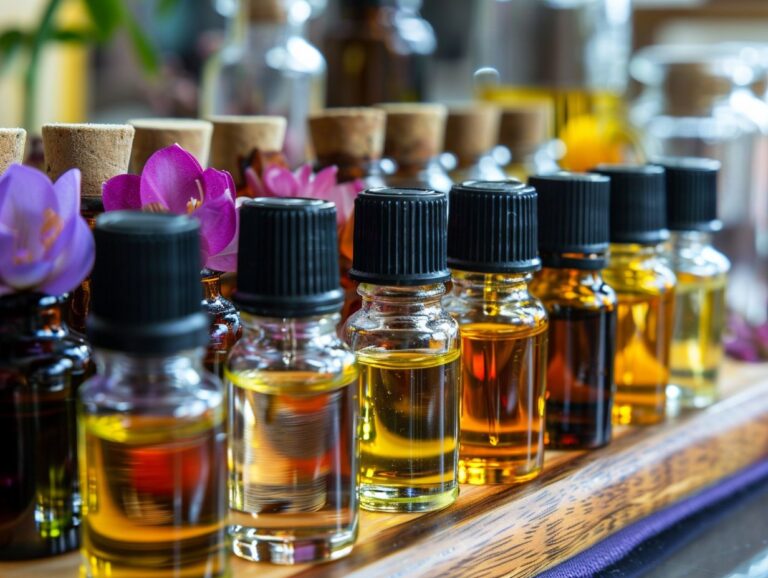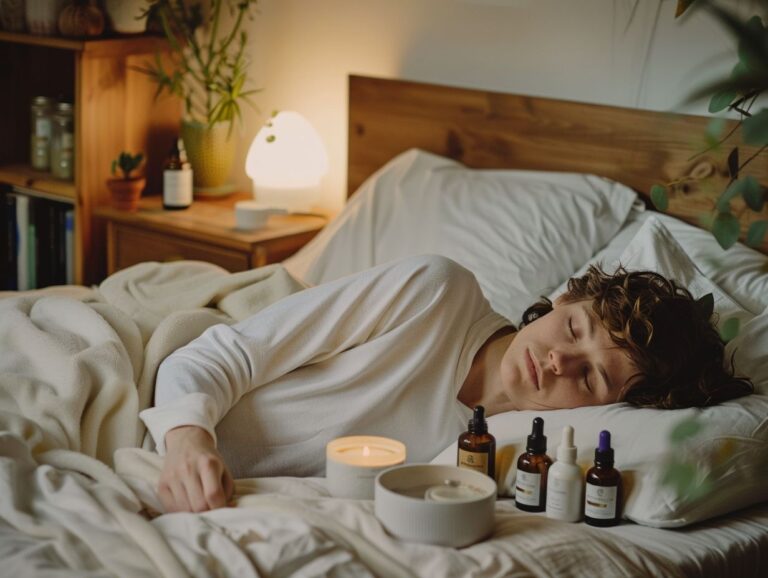Is It Good to Smell Essential Oils
Essential oils have become increasingly popular for their therapeutic benefits. We will explore what essential oils are, how they are used, and the numerous benefits of inhaling their aromatic scents. If you are wondering do you have to smell essential oils for them to work, continue reading to learn more.
From stress relief to immune system support, the power of essential oils is truly remarkable. It’s important to understand the safety precautions and potential side effects that come with smelling these potent oils.
So, is it good to smell essential oils? Let’s find out.
Key Takeaways:
What Are Essential Oils?
Essential oils are natural oils extracted from plants through distillation or cold pressing, containing the essence, aroma, and beneficial compounds of the plant. These oils, championed by experts like Dr. Lin and in practices like Ayurveda, are known for their various health benefits and aromatic properties.
Historically, essential oils have been used since ancient times, dating back to Egyptian and Chinese civilizations for their therapeutic and medicinal properties. The process of extracting these oils can vary depending on the plant, with methods including steam distillation, solvent extraction, or expression. In Ayurveda, these oils are considered balancing and healing agents, often recommended for improving physical, mental, and emotional well-being. Popular essential oils like lavender, tea tree oil, and eucalyptus are used in aromatherapy to promote relaxation, alleviate stress, boost immunity, and address various health concerns.
How Are Essential Oils Used?
Essential oils are used in various ways, including aromatherapy methods such as diffusion, topical application after dilution, and in some cases, ingestion for specific therapeutic benefits. The quality and purity of the oils, preferably therapeutic grade, are crucial for safe and effective use.
When using essential oils for diffusion, a few drops can be added to a diffuser with water to release the aroma into the air, creating a calming or invigorating atmosphere depending on the oil. For topical application, it is important to always
- dilute the essential oil with a carrier oil to avoid skin irritation
- conduct a patch test on a small area of skin before wider application
Quality assessment of the oils involves checking for purity, ensuring there are no synthetic additives or fillers that can diminish the effectiveness of the oil. Ingestion of essential oils should only be done under the guidance of a qualified professional, as some oils can be toxic if consumed incorrectly.
What Are the Benefits of Smelling Essential Oils?
Smelling essential oils offers a multitude of benefits for health and well-being. The aromatic compounds in oils like lavender, tea tree, and lemon have been studied for their positive effects on relaxation, skin health, and cognitive function.
Research suggests that the scent of lavender can help reduce anxiety and stress levels, promote relaxation and improve sleep quality. Tea tree oil is known for its antibacterial and antifungal properties, beneficial for treating skin conditions like acne and eczema. Additionally, peppermint oil has been linked to enhanced focus, alertness, and improved cognitive performance.
Relieves Stress and Anxiety
Aromatherapy with essential oils has been shown to relieve stress and anxiety, promoting relaxation and potentially improving cognitive function. Oils like lavender, tea tree, and eucalyptus are especially known for their calming effects.
Specifically, lavender oil is recognized for its ability to reduce stress levels and induce a calming effect on the mind and body. Eucalyptus oil, with its refreshing scent, can help clear the mind and alleviate mental fatigue, making it a popular choice for relaxation. Incorporating these oils into a diffuser or adding a few drops to a warm bath can create a soothing ambiance that promotes tranquility and mental well-being.
Improves Mood
Essential oils have the ability to enhance mood through their aromatic compounds that can positively impact emotions and mental well-being. Scents like citrus oils, bergamot, and rosemary are known for their mood-boosting properties.
These scents work by activating receptors in the olfactory system, which in turn send signals to the brain’s limbic system, a region responsible for emotions and memory processing. Bergamot oil, with its fresh and uplifting aroma, is often used to alleviate stress and anxiety, promoting feelings of relaxation and calmness.
Rosemary oil, on the other hand, is invigorating and can help improve focus and concentration, making it a great choice for those seeking mental clarity and productivity.
Aids in Sleep

Chamomile, for example, is recognized for its soothing properties that can help reduce anxiety and promote a sense of tranquility before bedtime. Sandalwood oil is often used to induce relaxation and deepen sleep. When these oils are combined in a blend, they can work synergistically to amplify their sleep-enhancing effects.
Reduces Headaches
Aromatherapy using essential oils like peppermint has been found to reduce headaches and migraines due to their soothing properties. The cooling effect of peppermint oil can provide relief and alleviate headache symptoms.
Peppermint oil is known for its ability to reduce muscle contractions and improve blood flow, thus helping to ease tension headaches. Inhaling peppermint oil through diffusers or steam inhalation can also help clear blocked sinuses, relieving sinus headaches. The refreshing scent of peppermint can help reduce stress and anxiety, often contributing to headache occurrences.
When used in combination with other essential oils like lavender or eucalyptus, peppermint oil can enhance the overall benefits of aromatherapy for headache relief. It’s important to dilute essential oils properly before application to prevent skin irritation and to maximize their therapeutic effects.
Boosts Immune System
Essential oils such as eucalyptus and lemon are known for their immune-boosting properties, promoting overall health and immune support. These oils can be used to create a supportive environment for the immune system.
Both eucalyptus and lemon oils possess powerful antibacterial and antiviral properties that can help combat pathogens that may compromise the immune system. Eucalyptus oil, with its refreshing scent, can clear the respiratory system and ease congestion, making it particularly beneficial during cold and flu seasons. Lemon oil, on the other hand, is rich in antioxidants and can aid in detoxification, supporting the body’s natural defense mechanisms. By incorporating these oils into your daily routine through diffusion, topical application, or inhalation, you can enhance your body’s resilience and well-being.
What Are the Safety Precautions When Smelling Essential Oils?
When using essential oils for aromatherapy, it is essential to take safety precautions to prevent adverse reactions, especially in vulnerable populations like children and pets. Diluting oils, avoiding direct skin contact, and ensuring proper ventilation are key safety measures to follow.
For children, it is highly recommended to dilute essential oils to a much greater extent than for adults, as their skin is more sensitive and they are prone to reactions. It is advisable to thoroughly research the specific oils being used and their recommended dilution ratios in child-friendly blends. Avoid applying undiluted or concentrated oils on children’s skin.
Similarly, with pets, it is crucial to keep essential oils out of their reach and ensure that diffusers are placed in well-ventilated areas where they cannot directly inhale the oils. Some oils, such as tea tree and citrus oils, are toxic to animals and should be strictly avoided around them.
Dilute the Oils
One crucial safety precaution when using essential oils is to dilute them properly to reduce the risk of skin irritation or adverse reactions. Opt for high-quality, therapeutic-grade oils for safe use, and avoid ingestion unless under professional guidance.
Diluting essential oils is essential to ensure that their potency is not overwhelming for the skin. When selecting essential oils for dilution, always look for reputable brands that prioritize quality and purity. Quality oils not only provide better results but also minimize the chances of skin sensitivities.
Avoid Direct Contact with Skin
To prevent skin irritation and potential allergic reactions, it is vital to avoid direct contact of undiluted essential oils with the skin. Patch testing and proper dilution methods can help mitigate the risk of adverse skin responses.
Undiluted essential oils are highly concentrated and can be too potent for direct skin application. Essential oils, when not properly diluted, may cause redness, itching, or even burns on sensitive skin. Patch testing involves applying a diluted solution on a small area and waiting 24 hours to check for any adverse reactions before widespread use.
Safe application methods, such as blending essential oils with carrier oils or lotions, help ensure gentle and effective use without overwhelming the skin. Avoiding contact with the eyes and mucous membranes is also crucial in preventing irritation. Remember, when it comes to essential oils, less is often more in terms of application to protect your skin’s health.
Do Not Ingest

Ingesting essential oils should be avoided unless under the guidance of a qualified healthcare provider or aromatherapist. The misuse of oils through ingestion can lead to adverse health effects and is not recommended without professional advice.
When essential oils are ingested improperly, they can irritate the digestive system, causing nausea, vomiting, or even damage to internal organs. It is crucial to understand that essential oils are highly concentrated extracts and can be toxic if consumed in large quantities. Experts emphasize that topical application or inhalation of essential oils are generally safer methods for reaping their benefits.
Use in Well-Ventilated Area
When utilizing essential oils, ensure the space is well-ventilated to avoid prolonged exposure to concentrated aromas. Proper ventilation helps disperse the aromatic compounds safely without overwhelming the senses.
When essential oils are diffused in poorly ventilated areas, there is a risk of the scents becoming overpowering, leading to potential discomfort or irritation. The molecules in essential oils, when inhaled in high concentrations, can be too strong for the olfactory system to process smoothly.
By allowing for proper airflow and circulation, the aromatic compounds can be more evenly distributed, creating a harmonious and pleasant atmosphere. Adequate ventilation facilitates the gradual release of scents, promoting a balanced and enjoyable olfactory experience for all individuals in the space.
Consult with a Doctor
Before incorporating essential oils into your routine, it is advisable to consult with a healthcare provider or a medical center, especially if you have underlying health conditions or are pregnant. Professional advice can help determine safe and effective usage.
Healthcare providers can provide valuable insights into possible interactions between essential oils and existing medications. They can also offer guidance on appropriate dosages and application methods tailored to your specific needs.
For pregnant individuals, it is crucial to ensure that the essential oils chosen are safe during pregnancy and do not pose any risks to the mother or the developing fetus. Medical consultation can help address any concerns or uncertainties regarding the use of essential oils in various trimesters.
What Are the Potential Side Effects of Smelling Essential Oils?
While essential oils offer numerous benefits, there are potential side effects to be aware of when smelling them. These may include allergic reactions, skin irritation, and in some cases, respiratory problems, especially for individuals with sensitivities.
It’s crucial to remember that even natural substances like essential oils can trigger adverse reactions in certain people. Allergic responses may manifest as skin rashes, itching, or respiratory distress. Those with sensitive skin should perform a patch test before using new oils directly on the skin to help minimize the risk of irritation. Individuals prone to respiratory issues, such as asthma, should approach inhalation of essential oils cautiously, as certain aromas can exacerbate breathing difficulties.
Allergic Reactions
Allergic reactions to essential oils can manifest as skin rashes, itching, or respiratory problems in sensitive individuals. It is essential to perform patch tests and discontinue use if adverse reactions occur.
When using essential oils, individuals should be aware of the different types of allergic reactions that may arise. Skin sensitivities are common, leading to redness, inflammation, or even blisters upon contact. Respiratory issues can also occur, such as coughing, wheezing, or difficulty breathing, particularly in those with underlying respiratory conditions. Patch testing, where a small amount of diluted oil is applied to the skin and observed for 24 hours, can help identify potential reactions. If any adverse effects are observed, immediate discontinuation of the oil is crucial to prevent further complications.
Skin Irritation
Skin irritation from essential oils can present as redness, itching, or discomfort upon contact, especially with undiluted oils. Blends containing oils like wintergreen, oregano, and cinnamon bark may be more likely to cause skin reactions.
Wintergreen oil, containing methyl salicylate, can lead to skin irritation if not properly diluted. Oregano oil, known for its antimicrobial properties, can also be harsh on sensitive skin. These potent oils can disrupt the skin’s barrier function, resulting in adverse reactions.
- It is essential to perform a patch test before using any essential oil, especially those known for potential irritant properties like wintergreen and oregano.
- Individuals with sensitive skin or pre-existing skin conditions should be cautious when using essential oil blends that contain these ingredients.
Respiratory Problems

Individuals with asthma, chronic obstructive pulmonary disease (COPD), or allergies may be more sensitive to the effects of essential oils on their respiratory system. It is crucial to dilute oils properly and consider individual sensitivities before inhalation. Prolonged exposure to strong aromas in confined spaces without proper air circulation can further irritate the airways and trigger respiratory symptoms.
Ensuring a well-ventilated area when using essential oils for aromatherapy or other purposes is imperative to reduce the risk of respiratory distress. This can involve opening windows, using fans, or running air purifiers to maintain air quality and minimize potential respiratory complications.
Conclusion: Is It Good to Smell Essential Oils?
In conclusion, smelling essential oils can offer a range of health benefits when used correctly and safely. Integrating these aromatic compounds into your routine, with guidance from professionals in integrative medicine like those at Cleveland Clinic, can enhance well-being and relaxation.
One of the key advantages of smelling essential oils is their ability to promote relaxation and reduce stress levels. The pleasant scents can have a calming effect on the mind and body, helping you unwind after a long day or prepare for a restful night’s sleep. Certain essential oils like lavender and chamomile are known for their potential to improve sleep quality and alleviate insomnia.
When used in moderation and as directed, essential oils may also aid in boosting mood and mental clarity. Scents like do essential oils smell good have invigorating properties, increasing alertness and concentration. These natural fragrances have been used for centuries in aromatherapy practices to stimulate the senses and improve cognitive function.
Frequently Asked Questions
Is it good to smell essential oils?
Yes, smelling essential oils can have various benefits such as improving mood, reducing stress and anxiety, and supporting respiratory and immune health.
What are some potential benefits of smelling essential oils?
Some potential benefits of smelling essential oils include relaxation, improved focus and clarity, pain relief, and boosting energy levels.
Can smelling essential oils be harmful?
While smelling essential oils can have many benefits, it is important to use them safely and in moderation. Some essential oils may cause adverse reactions in individuals with certain medical conditions, and they should be avoided during pregnancy.
How should I use essential oils for aromatherapy?
To use essential oils for aromatherapy, you can add a few drops to a diffuser, inhale directly from the bottle, or mix with a carrier oil and apply to the skin. It is important to dilute essential oils properly and follow recommended usage guidelines.
Can smelling essential oils help with headaches?
Yes, certain essential oils like peppermint, lavender, and eucalyptus have been shown to relieve headaches and migraines. You can inhale the oils directly or add a few drops to a warm compress for localized relief.
Are there any precautions I should take when smelling essential oils?
Yes, some essential oils can be irritating to the skin or cause allergic reactions. It is important to always dilute them properly and perform a skin patch test before using them on larger areas of the body. It is also recommended to seek advice from a healthcare professional before using essential oils if you have any pre-existing medical conditions.








One Comment